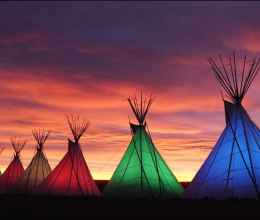
Montana State University-Northern and the Sweetgrass Society, a Native student organization, have signed an agreement to resolve complaints filed by Sweetgrass Society members with the Montana Human Rights Bureau.
“Our goal was to ensure that all Indigenous students can feel like this is their campus, that they can feel safe, and that institutionally, all members of campus recognize that the cultures, contributions, and successes of the Native community enhance the MSU-Northern community,” said Amy Murdock (Assiniboine), Sweetgrass Society’s president.
Murdock continued, “When people are open to listening, learning, and coming together to recognize and condemn racism when it happens, then the possibility for change and healing is real. We cannot move forward if we do not all go forward together. The Sweetgrass Society invites all community members to come together and stand together and we are excited for the opportunities that MSU Northern is creating as a partner for change.”
“We recognize the concerns of the Sweetgrass Society. As an administration, we are re-affirming our commitment to a welcoming environment for our Native students,” said MSU-Northern Chancellor Greg Kegel. “Through this process, we have identified a number of opportunities to expand Northern’s relationships with Native students and to collaborate further with our regional tribes. I am very supportive of our Native students, and I am enthusiastic about the opportunities we have identified. They will benefit the entire student body.”
The agreement resolves the students’ complaints of racial discrimination and violation of their First Amendment rights stemming from an incident involving the university’s Hello Walk, an outdoor staircase where student clubs annually paint a step with a message of their choice. In 2016, the Sweetgrass Society included a “#NoDAPL” message on its step. #NoDAPL refers to a grassroots Indigenous movement that began in early 2016 in response to the approved construction of Energy Transfer Partners' Dakota Access Pipeline. The movement earned significant media attention when the opposition of the Standing Rock Sioux tribe over the pipeline’s route through sacred burial grounds brought together Native people from across the country. Later, the Sweetgrass Society’s #NoDAPL message was the only group stair painted over and the club alleged the act was a racially motivated violation of their members’ First Amendment rights.
As part of the agreement, the administration and Sweetgrass Society will develop a diversity education program for students, faculty, and staff that includes implicit bias training. MSU-Northern has also formed an American Indian Advisory Council as a forum to seek input from local tribal cultural experts. This group held its first meeting on January 31, 2018, and will meet on a regular basis and will provide the Chancellor with observations and suggestions that will help enhance the student experience for Northern’s Native students and the entire student body.
The university will also be highlighting the accomplishments of Native American alumni and will conduct a review of its hiring process and make changes, if necessary, to ensure the university’s hiring process is inclusive for Native American applicants.
The agreement comes after the hiring of Dr. Margarett Campbell as MSU-Northern’s new director of Indian Education/Tribal Liaison and Special Advisor to the Chancellor. Dr. Campbell will deliver and facilitate professional development for campus faculty and staff, specifically in the areas of cultural responsiveness and Montana’s Indian Education for All Act, as part of the Little River Institute (NASNTI grant). Dr. Campbell will also serve as a tribal liaison for MSU-Northern, facilitating relationships and collaborations with its nearby tribal communities and tribally controlled community colleges. She will be teaching and developing the curriculum for several of MSU-Northern’s American Indian courses. Additionally, Northern continues to seek Native faculty and staff to fill needed roles at MSU.
“Dr. Campbell will play a critical role in helping us increase our enrollment of Native students. She will be instrumental in helping us to recruit more Indigenous faculty, staff, and administrators,” said Kegel.
The Sweetgrass Society was represented by the ACLU of Montana in its complaint against the university.
Caitlin Borgmann, ACLU of Montana Executive Director, commended the students: “The Sweetgrass Society’s student activism, courage and character will have positive impacts for generations to come. They have spoken up in the face of discrimination and have shown a path towards understanding, reconciliation, and change. We are happy that the administration has taken the Sweetgrass Society’s concerns seriously. MSU Northern has turned racial discrimination into an opportunity to stand alongside the Sweetgrass Society and use the university’s platform to push new critical conversations to listen, learn, and stand with the students to create an equitable college experience for all students.”
The complaint and settlement are available below as PDFs.






